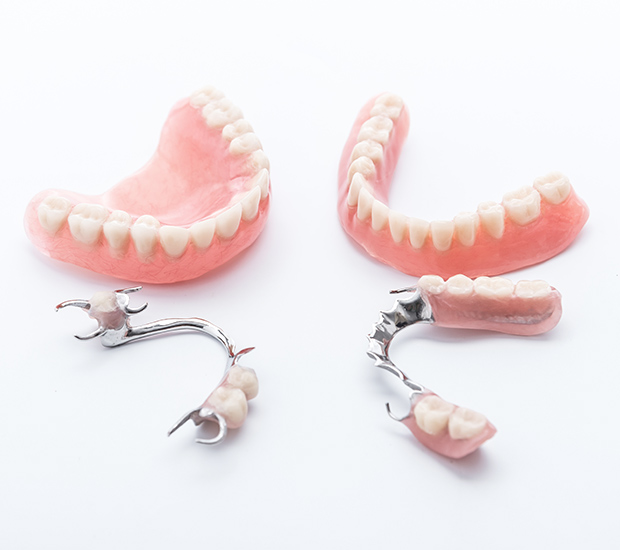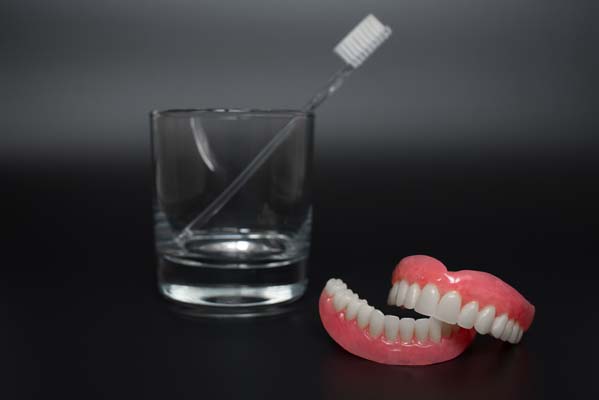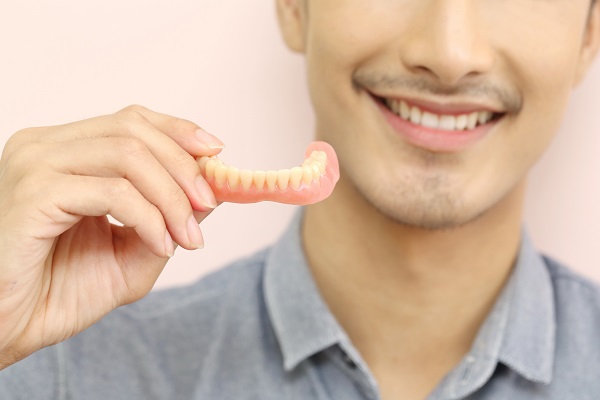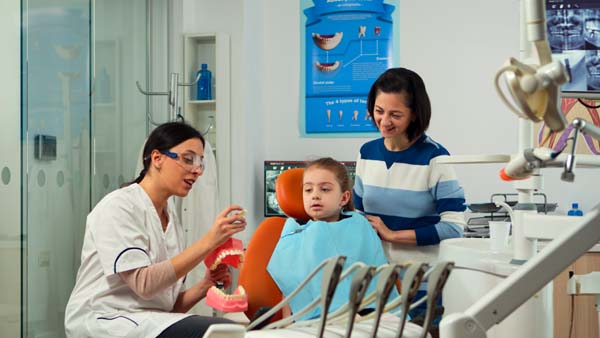Dentures and Partial Dentures Greensboro, NC
No matter the reason for tooth loss in adults, we can use dentures to provide an effective and natural-looking replacement. With our dentures, you will be able to eat and speak as you usually would. We offer full and partial dentures that we will customize to your needs. Dentures and partial dentures are artificial teeth that can replace an entire row of teeth or all teeth in a mouth.
Dentures and partial dentures are available at Dental Center of the Carolinas in Greensboro and the surrounding area. Along with helping patients chew and speak without issue, dentures can also help create the appearance of a full smile again. With our help, you can obtain a set of functioning teeth and restore your smile.
Call us today at (336) 738-3953 and schedule a time to discuss replacing your teeth with dentures or partial dentures.
Dentures Can Help Prevent Further Oral Health Issues
The purpose of dental care and oral hygiene is to prevent tooth loss as much as possible. However, there are cases in which tooth loss is unavoidable. When an infection advances to later stages or begins to spread, tooth extraction may become the only option. If a tooth falls out on its own or is knocked out, there is a chance the empty socket can cause the other teeth to begin to shift.
The doctor can help restore missing teeth with dentures or partial dentures. By ensuring there are no more traces of infection in the mouth, dentures can help to prevent the spread of further contamination to the mouth or jaw. Even with dentures, patients will want to continue an oral hygiene routine that involves keeping the gums and mouth clean.
With partial dentures or at least several natural teeth still in the mouth, it is essential to keep up regular oral hygiene methods, including:
- Daily brushing. As soon as teeth emerge in a child’s mouth, it is vital to brush regularly. It is wise to brush at least twice daily through one’s entire life.
- Consistent flossing. Daily flossing will remove food from between teeth. Doing this will keep bacteria from growing on the gums and beneath the teeth.
- Regular visits to the dentist. Patients should visit our dental staff at least once every six months. More frequent visits may be necessary for restorative care.
Other Benefits
While dentures and partial dentures may not be for everyone, they can help people experience the satisfaction of a full smile and eating favorite foods again. Dentures closely resemble natural teeth. We will make sure the artificial teeth match the color of any remaining real teeth. Dentures can also give a person’s cheeks a more defined shape and appearance.
Check out what others are saying about our denture and partial denture services on Yelp: Dentures and Partial Dentures Greensboro
Importance of Replacing Teeth
Since the teeth play a crucial role in multiple aspects of one's life, it is essential to keep up one's oral health routine. If one tooth has an infection, then there is a chance of it spreading to other teeth and the jaw. Plaque that remains on the teeth long enough can cause decay and lead to tooth loss. Fortunately, we can use dentures and partial dentures to restore a smile and boost oral health.
Along with functioning in the same way teeth do and providing the appearance of a natural smile, dentures can replace damaged teeth that cause the patient pain. While the patient can take necessary steps to prevent tooth loss, oral hygiene may not be enough once the infection reaches a more severe stage. In other cases, patients may have a gap or several gaps due to missing teeth.
Once permanent adult teeth fall out, there is no way to grow new ones. Thankfully, we can use dentures or partial dentures to replace them. Dentures will replace an entire row of teeth along the upper or lower jaw, while partial dentures can replace several teeth or half of a row of teeth.
Dentures vs. Partial Dentures
As discussed in an article by the Oral Health Foundation, there are differences between full and partial dentures. Full dentures are a good option for patients who have no remaining teeth, or whose damaged teeth are beyond repair or salvaging.
Meanwhile, a partial appliance makes sense when the person still has some natural teeth remaining. At Dental Center of the Carolinas, we can fit patients with either one of these mouth appliances.
Permanent Dentures
There are forms of permanent dentures as well, though these may not be as common as the removable type. Permanent dentures can be more secure and durable. With permanent dentures, we anchor this apparatus to the jaw with implants. People choose these dentures to help avoid the embarrassment of the appliance slipping out while speaking or eating.
Deciding If Dentures Are Right for You
Living without teeth can be difficult, both physically and emotionally. People who are missing teeth recognize the need to replace them but may not know which option is right. Patients should speak with our staff about dentures and partial dentures, along with other possibilities.
We can help patients who are researching the pros and cons of each tooth replacement option. If there are any concerns or questions about dentures, patients can ask our staff.
How Dentures Work
The doctor should speak openly to their patients about dentures and partial dentures. Patients need to understand the benefits and possible drawbacks of this treatment. Unlike implants and bridges, dentures are removable. This apparatus consists of a gum-colored acrylic base and artificial teeth.
The teeth usually consist of metal, covered in plastic. The patient will fit the dentures over the gums. Denture adhesive products are available to help keep the appliance firmly in place in the mouth. After a few days to adjust, the patient should not experience discomfort or irritation when wearing the dentures. If pain persists, contact your dentist.
The Process of Getting Dentures
Our dentist will first meet with the patient to discuss the treatment and what to expect. Team members will take X-rays and make impressions of the patient’s mouth. These will go to a lab technician who can customize the appliance for the patient. At this first appointment, our dentist may remove any decayed or severely damaged teeth. If necessary, this may occur at a subsequent appointment.
Once the dentures are ready, the patient will return to Dental Center of the Carolinas for the fitting process. This appointment will also happen after the gums have healed following any tooth extractions. In making sure the dentures fit correctly, we will also make any adjustments when necessary. Once complete, the patient will be able to bite down without issue.
Follow-Up Care
All types of medical and dental procedures have potential side effects. Fortunately, getting dentures is less risky than other tooth-replacement options. It can take some time for the wearer to adjust to having dentures in the mouth. After several days, the wearer should feel comfortable. There may also be some minor pain, soreness, and irritation in the gums. Patients should contact our office right away if these problems persist.
It is still essential for patients to visit our office for regular dental appointments, even after getting dentures. Our dentist will examine the patient’s gums and will also make sure the dentures still fit well and are functioning correctly. Once the appliance starts to wear out, we can make a new one for the patient.
Main Teeth Replacement Options
There are several options that patients can choose from when it comes to teeth replacement. Some people may rely on more than one, depending on the situation.
1. Implants
This option is the most permanent, having the potential to go without a replacement. It requires several visits, time for healing, and may take a year to complete. The process involves placing an implant into the bone structure of the jaw, where it should sit permanently. The dentist then places a crown over the implant for a realistic look. Most patients can then use the tooth immediately.
2. Bridges
An often-faster option and, depending on insurance, more cost-conscious option is to get bridges. However, unlike implants, these typically need replacement every five to ten years. With exceptional care, some people extend that lifespan to about 15 years. Bridges involve cementing an artificial tooth into the available gap and securing it to the natural teeth or implants on both or either side. This procedure typically takes about two visits to complete and may include a crown.
3. Dentures
Patients may choose to get either full or partial dentures, depending on the extent of tooth loss. Most types of dentures are removable. If a person still has natural teeth, the dentist must note the color of the teeth and gums. That way, the doctor can ensure the coating of the dentures match the natural teeth, especially if the teeth are visible.
Care and Maintenance of the Dentures
Though dentures are durable and help the patient once again bite into food, these appliances can break. Dentures can also warp or get dirty, so it is vital that people follow proper maintenance guidelines, as described in this article on the American Dental Association website. Our team at Dental Center of the Carolinas will counsel each patient on proper care to extend the life of their dentures. Though, ultimately, it is up to the patient to be diligent in routine care and contacting the dentist when problems arise.
After eating a meal, a patient should remove their dentures and rinse the appliance thoroughly with water, removing excess food. Also, patients should brush the dentures with a soft toothbrush and non-abrasive toothpaste. When it is time to retire for the night, the person should remove the dentures. Some denture wearers soak their dentures in a solution. You may contact our team to see if a denture solution is recommended for your care routine.
What to Do in Case of Breakage
There are plenty of ways to repair your dentures in the event of an accident. It is almost inevitable that patients will find a crack or break in the appliance at some point. The base could crack, or a tooth could break loose. For a quick fix, there are products available online and at most local grocery stores and pharmacies, such as D.O.C.® Repair-It®, Cushion Grip®, and Perk ®'s Denture Repair Kit. If you are considering using a product for a temporary fix, please contact your dental office first. Whenever significant damage occurs, like a large crack across the base, you should seek medical treatment.
In any case of breakage, the denture-wearer should contact our office right away. Our team has the right tools and equipment to fix the dentures properly. Patients can feel good that our dental professionals will carefully examine the damage and repair it. If necessary, the dentist may have to replace the dentures altogether.
Avoiding Problems
While some situations may be challenging to prevent, patients can minimize repair needs. People with dentures should be careful with certain hard foods such as nuts, popcorn kernels, ice, and candy. Some sticky foods may also pull out the dentures. When cleaning the appliance, the individual should place a towel or cloth on the counter or in the sink in case the dentures fall. Denture-wearers who play sports should wear a mouthguard to protect the dentures.
Denture Myths Versus Reality
There are many misconceptions about dentures that can stand in the way of people getting the care they need. Learning the facts about some common myths can help patients better understand their options. Talk to our team to get further information and specific advice for your situation.
- Myth #1: Discomfort and irritation is a normal part of having to wear dentures. Today’s techniques allow the creation of dentures that fit well. If you are not comfortable, it is a sign that something is wrong. If this is the case, consult a dentist.
- Myth #2: Getting dentures means not having to return to the dentist again. Even if you no longer have natural teeth, seeing the dentist at least once a year is vital to maintaining oral health. Dentists can identify and treat gum issues and other problems. They can also adjust your dentures and make sure everything is going well.
- Myth #3: Getting dentures means never being able to eat anything besides soft food again. While it can take a little time to adjust to the feel of eating with dentures, many people can enjoy a variety of foods. The dental team can talk to you in further detail about any concerns regarding the potential effect of your diet on your dentures.
Questions Answered on This Page
Q. Are there different types of dentures?
Q. Are there dentures to replace a few of my teeth?
Q. What are the benefits of dentures?
People Also Ask
Q. How do I take care of my dentures?
Q. What do I do if I damage my dentures?
Q. What do I need to know about making adjustments to my dentures?
Definition of Denture Terminology
- Alveolar Bone
- The alveolar bone is the bone surrounding the root of the tooth that keeps the tooth in place.
- Clasp
- A clasp is a device that holds a removable partial denture prosthesis to the teeth.
- Denture Base
- The denture base is the part of the denture that connects the artificial teeth with the soft tissue of the gums.
- Edentulous
- Edentulous is a term that applies to people who do not have any teeth.
- Periodontal Disease
- Periodontal disease is a condition that causes inflammation of the gingival tissues and membrane of the teeth, leading to tooth loss without professional treatment.
- Pontic
- Pontic is another term for an artificial tooth on a fixed partial denture.
- Rebase
- Rebase is the process of refitting denture prosthesis by replacing the base material.
- Reline
- Reline is when a professional resurfaces the surface of the prosthesis with a new base material.
- Resin/Acrylic
- Resin and Acrylic are resinous materials that can be components in a denture base.
- Stomatitis
- Stomatitis is the inflammation of the tissue that is underlying a denture that does not fit properly. It can also result from other oral health factors.
Back to top of Artificial Teeth




